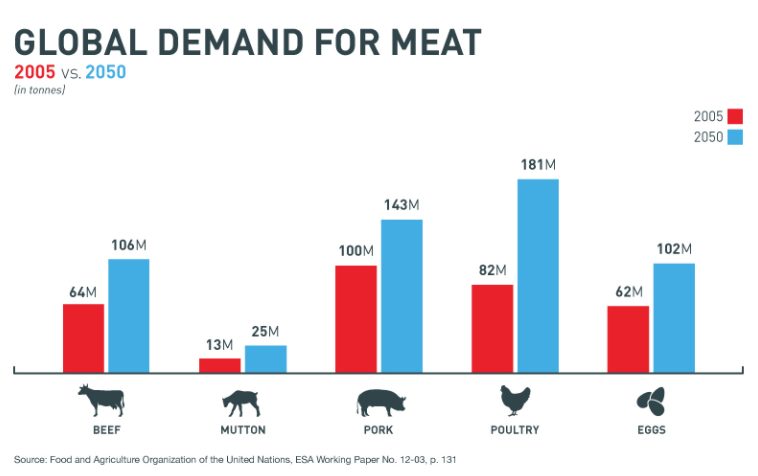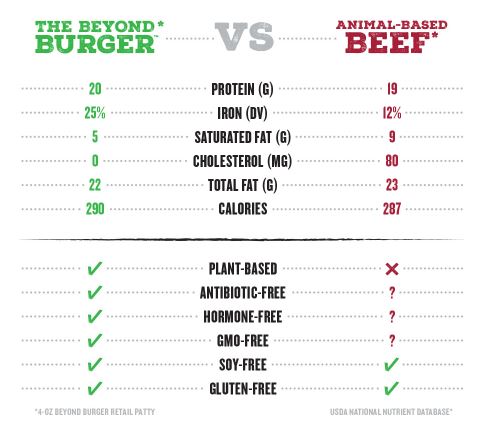One of the main problems of getting people to stop eating meat is the fact that people simply do not want to, it has been part of many people’s diet since forever and the norm in many cultures. But why is meat production a problem? Many people are uncomfortable with the way animals are slaughtered (which while is a ethical problem – its not the reason for a NEED to cut down), but the actual problem is carbon, the unnatural amount of animals living today are producing.

Traditional livestock farming accounts for an estimated 18% of global greenhouse emissions, uses 70% of the world’s water, and exhausts 47,000 square miles of land every year. Only around 30% of an animal itself is meat we eat, and the rest is not useful, so it’s a very inefficient way of producing protein. By 2050, the world population will grow more than 9 billion and people’s appetite for meat will grow alongside this. By manufacturing meat instead, 4 global problems can be solved simultaneously – climate change; animal welfare; natural resources, and human health.

Beyond Meat is a mass market solution to this problem, which replaces animal protein with plant protein. While the important part of meat – protein – is contained within the burger, the bad – cholesterol, gluten and dairy- are not. Not only this, Beyond Burger has more protein, sodium, and calories than a normal burger. Trace amounts of beet lend the beefy red colour, while coconut oil and potato starch ensure the juiciness and chew. Beyond Beef is 100% pea protein and Beyond Chicken is a blend of soy and pea protein. Protein isolates are usually used in foods like baby formula to provide the highest amount of clean plant protein possible. A proprietary system is used to produce the burgers, which applies heating, cooling and pressure to align plant-proteins in the same fibrous structures that you’d find in animal proteins. Beyond Burger is available in 11,000 stores nationwide in the US, including Walmart, Target, Whole Foods, Kroger, Safeway and many more.
One of the main criticisms of Beyond Meat, is the fact that there are already many meat alternatives out on the market, such as Quorn, which while successful, has not led to a reduction in global demand for meat or a shift away from it. However the target market customers of Beyond Meat are not aimed at already vegetarians / vegans (like most other vegetarian brands), but the meat eater’s themselves. This leads to another criticism though – Can we ever have a real duplicate of meat tasting the same? According to Brown, “We’re not there yet. It will be a while before we perfectly replicate meat, but fortunately for us, if you put it our product in a taco or bolognese or something, it’s very hard to tell the difference,” he said. “Naked side by side, it’s still clear which one is plant-based.” – Brown. In 2014, Whole Foods forced a recall for 3 chicken curry salads after mixing up the labels of real chicken and Beyond Meat’s version. None of the customers however could tell a mistake had been made according to the New York Times. According to Brown “It has to be just as good as, just as convenient as and maybe even cheaper than ground beef or chicken. Our business is to create something better than meat; otherwise we are not going to move the needle”.
Impossible Foods, have also developed a plant-based burger that looks, tastes, and behaves like real meat. Its secret is heme, an iron-rich molecule that gives meat its meaty taste. Heme can be found in the roots of nitrogen-fixing plants, but Impossible Foods has explained it is more economical and sustainable to make it through industrial fermentation—a process by which it transfers a gene from the soybean plant into yeast, grows the yeast, and then isolates heme in the resulting broth.
Other meat alternatives such as Memphis Meat focus on technology to make meat from self-producing animal cells. Both Richard Branson and Bill Gates, Cargill Protein, as well as venture capital firms, DFJ, Atomico, New Crop Capital and KBW Ventures have all helped fund the start-up.
“I believe that in 30 years or so we will no longer need to kill any animals and that all meat will either be clean or plant-based, taste the same and also be much healthier for everyone. – Richard Branson
“We believe that consumers will continue to crave meat, and we aim to bring it to the table, as sustainably and cost-effectively as we can. Cultured meats and conventionally produced meats will both play a role in meeting that demand.” – Uma Valeti, co-founder and chief executive officer of Memphis Meats.
One of the obvious problems with this start-up and most is the high cost involved in producing meat this way. People are also hesitant towards mixing technology with food – preferences for meat are maintained by multiple factors including historical dependence of tastes, socially established meanings of consumption choices, and institutional inertia. As with most of the innovations and start-ups I have explored recently, the most important way to bring about change and demand for these alternatives to what we currently use is sustainable marketing – educating and encouraging people to be more sustainable by explaining how making these changes benefits them individually, not just collectively. This is because marketing in a capitalist society is focused around materialism and selling to the individual, so I believe it is not enough to just explain the positives to the collective society and the environment which sustainability brings, but to the individual too.
